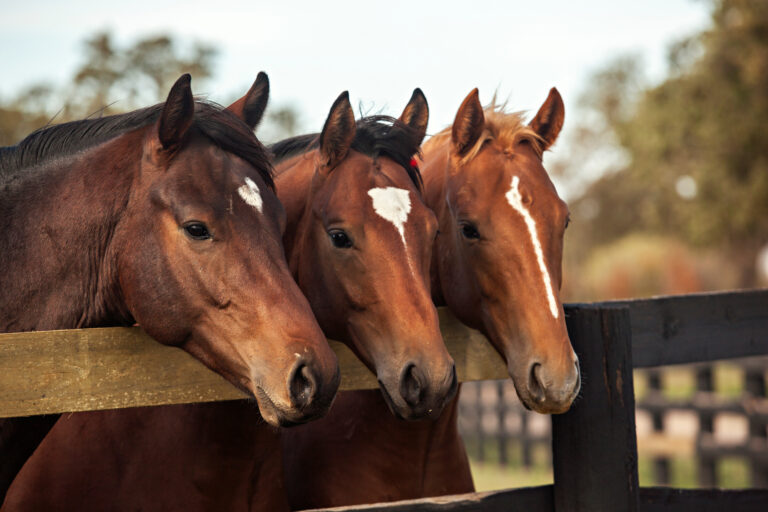
Equine nutritionist Dr. Steve Duren talks about performance horse nutrition in this episode of the Disease Du Jour podcast.
Duren has said that performance horses are not “normal.” He said performance horses are taken out of a natural environment and have “abnormal” lives. “Abnormalities” include being kept in a stall, fed in meals instead of constant forage intake, being transported in trailers, and even being ridden.
Categories of Performance Horses
Veterinarians will have as patients a variety of horses. Duren likes to categorize the “performance” horses as follows:
- Infrequent light exercise These horses infrequently ride the horse, but it is well cared for. Duren said these horses are often easy keepers.
- Frequent light exercise These horses are exercised four or five times a week for short periods of time (30-40 minutes). The exercise is mostly walking and trotting with a little canter/lope. These horses might show on weekends or maybe once a month.
- Moderate exercise These horses are generally exercised five days a week, with 15% of the riding is at performance level such as dressage or western performance horses. The exercise sessions usually are about 60 minutes a day. These can be English or Western performance horses. Their energy requirements are higher and need more feed to satisfy that caloric requirement.
- Heavy exercise These horses exercise 5-6 days a week about 60 minutes a day. About 30% of their exercise time is spent in their discipline. These include eventing horses.
Duren said veterinarians need to realize that most owners will over-estimate the amount of work a horse is doing. “Horses are capable of a tremendous amount of work,” said Duren.
Common Performance Horse Nutrition Issues
There is a plethora of health and disease issues in horses that are related to nutrition. In this podcast, we talk to Duren about some of the most common ones that equine veterinarians will see in client horses.
Poor Performance
Duren said the veterinarian will look for disease or health issues to explain poor performance in horses. As a nutritionist and exercise physiologist, he looks toward calorie expenditure versus intake. He also focuses on whether the horse is properly conditioned for what it is trying to do.
Shifts in the Microbiome
Duren discussed a popular area of equine research today is the microbiome of the horse’s gut. “We now know that shifts in the equine microbiome affects how the horse digests food,” said Duren. “The microbiome can be affected by changes in management, exercise and diet.”
Equine Gastric Ulcer Syndrome (EGUS)
Duren said researchers have found that from 40-93% of performance horses have gastric ulcers. And he reminded the audience that “horses have had ulcers longer than we have been able to identify them.” Duren said while you can’t change transport or exercise in these performance horses with EGUS, you can change the diet. That might mean feeds with different ingredients and eliminating fasting in the horse’s life. Duren said “pre-loading” the digestive system with alfalfa 60 minutes prior to exercise can help. “Calcium is known to be a stomach buffer,” he noted.
Metabolic Issues
Duren said most veterinarians think of IR and Cushing’s disease when discussing metabolic issues in performance horses. However, he said practitioners are more likely to see issues such as tying-up. He went on to discuss RER and PSSM types 1 and 2, which are treated differently through diet.
Skin Allergies
Duren said these can be caused by anything the horse inhales, digests or is exposed to in the environment. He said a horse’s digestive system can become “leaky” when the GI tract is compromised. Leaky gut syndrome is a topic that Duren agreed to discuss in a future issue of the Disease Du Jour podcast.
About Dr. Steve Duren
Steve Duren, BS, MS, PhD, PAS, founded Performance Horse Nutrition in 2002. He consults with feed manufacturers and horse owners throughout the world. Dr. Duren authored the book “The 101 Most Frequently Asked Horse Nutrition Questions” and co-authored the book “The Concise Guide to Nutrition in the Horse.” Duren completed his Bachelor in Animal Sciences at the University of Idaho, and completed his Master of Science and Doctor of Philosophy in Equine Nutrition and Exercise Physiology from the University of Kentucky. Duren is recognized by the American Registry of Professional Animal Scientists as a member in good standing. He is also a member of the Equine Science Society (ESS), where he served as a board member.








